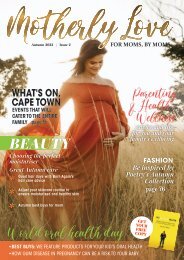Motherly Love Summer 2021
Motherly Love is a family lifestyle brand that is aimed to inform & inspire modern women through the journey of motherhood
Motherly Love is a family lifestyle brand that is aimed to inform & inspire modern women through the journey of motherhood
Create successful ePaper yourself
Turn your PDF publications into a flip-book with our unique Google optimized e-Paper software.
BABY breastfeeding
within 24 hours to prevent the
growth of harmful bacteria.
Lastly, thawed milk should not be
refrozen, as there is not information
in regard to the safety of refreezing
previously thawed milk.
Q. Can I drink alcohol while
exclusively breastfeeding?
A. You can drink a small quantity of
alcohol without causing any harm to
your baby. It’s definitely best to limit
the amount you drink to one drink
(i.e. 120ml of wine) at a time. If you
feel tipsy or drunk, it’s best to refrain
from breastfeeding, as this means the
levels of alcohol in your blood are too
high to be safe for your baby.
Too much alcohol interferes
with babies’ sleep-wake cycles,
feeding, and weight gain and growth.
Long-term alcohol exposure
negatively impacts brain and nerve
development.
Q. Is feeding impacted by surgery
(augmentation/reduction/
reconstruction)?
A. Yes, breast surgeries can affect
breastfeeding. Fortunately, most
mothers with a history of breast
surgery can achieve at least a partial
milk supply if they work in
consultation with a lactation
specialist. If you have had breast
surgery, it can be helpful to meet
with a lactation specialist while you
are pregnant, so you can learn what
to anticipate when you start
breastfeeding.
Nursing in the setting of previous
breast surgery may include frequent
pumping, the use of galactagogues
(herbs and medications to increase
milk supply), supplemental nursing
systems, and/or donor breast milk.
Q. Will introducing a bottle
interfere with continuing to nurse?
A. This is a difficult question to
answer, as the jury is still out as to
whether or not ‘nipple confusion’
actually exists. Some babies are able
to switch back and forth between
feeding at the breast and by bottle
without a problem, but there’s no
real way to anticipate how a baby
will do with this ahead of time.
Some babies will seem to ‘prefer’
the bottle, as the milk may come
out quicker and easier than at the
breast.
If this is the case, it can be helpful
to experiment with different types of
nipples. Some slower-flow nipples
mimic the flow of breast milk from
mothers’ breasts and can be helpful
in these situations.
If your baby does not need to be
supplemented via bottle for medical
reasons, such as significant jaundice
or low blood sugar levels, it’s best
to wait until breastfeeding is wellestablished
to begin to give pumped
milk by bottle.
Some newborns will refuse to take
bottles of milk from their moms, so
it’s often recommended that a baby’s
father, or another caregiver, give the
first bottle.
Q. Should I stop breastfeeding
if I am sick?
A. In most cases you should
continue to breastfeed when you
are sick. Breast milk contains
helpful antibodies that pass from
moms to babies to help protect them
from infections.
There are only a few absolute
contraindications to breastfeeding.
Infants should not receive breast
milk if any of the following
conditions exist:
• Baby is born with a metabolic
condition called galactosemia.
These babies cannot have any
milk and will need to be formulafed
for the long haul.
• Mother has any of the following
viruses: human immunodeficiency
virus (HIV), Ebola virus, or human
T-lymphotropic virus type 1 or
type 2 (HTLV 1/2).
Mothers who have the coronavirus
(COVID-19) are encouraged to
breastfeed and/or provide pumped
milk, as long as they are well able
to do so.
To date, there have been no
reports of babies getting coronavirus
from their moms’ milk. In order to
prevent the spread to babies,
breastfeeding mothers who have
COVID-19 (or suspected COVID-19)
do all of the following:
• Wash your hands or use an
alcohol-based hand sanitiser
before touching your baby.
• Wear a mask or cloth face
covering while feeding your
baby at the breast.
• Wash your hands before
touching your pump or bottle
parts and clean all parts after
each use.
• If you are very ill, have a caregiver
who is well feed your baby your
pumped milk.
Q. Where can I go to get
more support?
A. Today’s moms are fortunate
to have so many great options for
breastfeeding support. Sources
of support include family members
and friends, lactation consultants,
support groups for moms of
newborns (both in-person and
virtual), postpartum doulas, books,
videos and the Internet.
Every mother’s breastfeeding
journey is unique. Breastfeeding
can be difficult, easy, tiring,
rewarding, beautiful, messy,
exhausting, fulfilling, confusing,
joyful and challenging (and this may
change day-to-day, or even hour-tohour).
Like so many other aspects of
parenting, expectations of
breastfeeding do not always meet
the reality.
Lastly, there are great benefits
to your baby receiving any breast
milk at all, and your success (or
lack of) in breastfeeding has no
bearing on how good of a mom
you are, or your long-term
relationship with your baby.
20 Motherly
LOVE Issue 1




